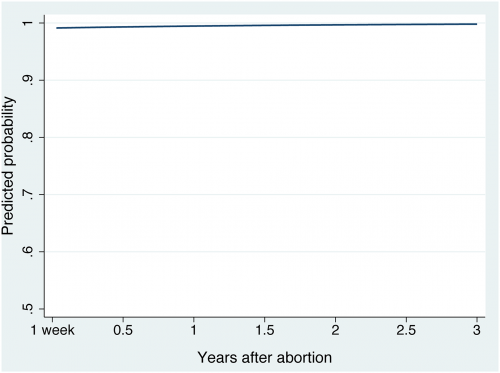A new article reports the findings from a longitudinal study that followed 667 women who had early- and later-term abortions for three years after their procedure. Dr. Corinne Rocca and her colleagues asked women if they felt that the abortion was the “right decision” at one week and approximately every six months thereafter.
This is your image of the week:
Percent of women reporting that abortion was the right decision over three years:
Over 99% of the women said that the abortion was the right decision at every time point. The line that looks like the upper barrier of the graph? That’s the data.
Overall, measures of negative emotions were relatively low — an average score of under 4 on a 16-point scale at one week and declining to about 2 at three years — and were higher for women who had a more difficult time deciding whether to get an abortion or who subsequently had planned pregnancies. Whether the abortion occurred in the first trimester or near the legal limit did not correlate with emotional response.
In contrast, women reported twice as many positive emotions at one week. Over time, positive feelings about the abortion declined along with negative ones, suggesting that the experience became less emotionally charged overall with distance from the procedure.
Lisa Wade, PhD is an Associate Professor at Tulane University. She is the author of American Hookup, a book about college sexual culture; a textbook about gender; and a forthcoming introductory text: Terrible Magnificent Sociology. You can follow her on Twitter and Instagram.

Comments 14
Tamara — July 18, 2015
Hi,
Sorry to bother but the graph says "predicted probability" which are not the same as percentages (a predicted probability of 1 means there is 100% chance women of all ages will regret the abortion). I do not know which one you meant to present, this is probably just an issue with labeling the graph in stata :)
pdk — July 19, 2015
Your title, "Percent of women..." The ordinate: ~1, at face value that is 1%, not 100%, instead of percent of women, it would more accurately read "fraction of women...". Also, the ordinate should go down to 0 to more accurately represent the data...
Comradde PhysioProffe — July 19, 2015
Something seems weird about this survey result. 99% on one side of a question doesn't pass the smell test, no matter what the question is. If you asked 667 people whether blankets crocheted by grandmas are worse than Hitler, you'd get a lot more than 1%. Something is wrong with this.
Dan — July 20, 2015
I would think that the study demonstrates how effective people are at rationalizing their decisions more than anything else. I think if you asked the same number of women who considered abortions but decided to keep their babies if they regret their decision, you'd probably get the same results.
I'm not saying their decision to have an abortion wasn't the correct one, I'm just saying that I don't see that this (or any) study could indicate that either way.
Bill R — July 20, 2015
If you asked 100 people who took a hair-of-the-dog the morning after a days-long bender if they regretted that morning drink 99 would probably say no.
So what have we learned from this?
madonna sin — July 21, 2015
As many other people mentioned, this is a flawed study. They should have also asked mothers about how they feel about NOT having an abortion and keeping their baby. The number will most likely be lower than 1% presented here.
paul schaefer — July 29, 2015
The heading is wrong. The right heading (taken from the homepage) is : "Mean predicted probability of reporting that abortion was the right decision over three years after an abortion.". "That’s the data." is clearly not the case. those are predictions from a model. The model they used is controlling for allmost everything which could make you regret an abortion. For this reason it is hard to tell what is really going on. In my opinion the sample averages would be much more interesting.